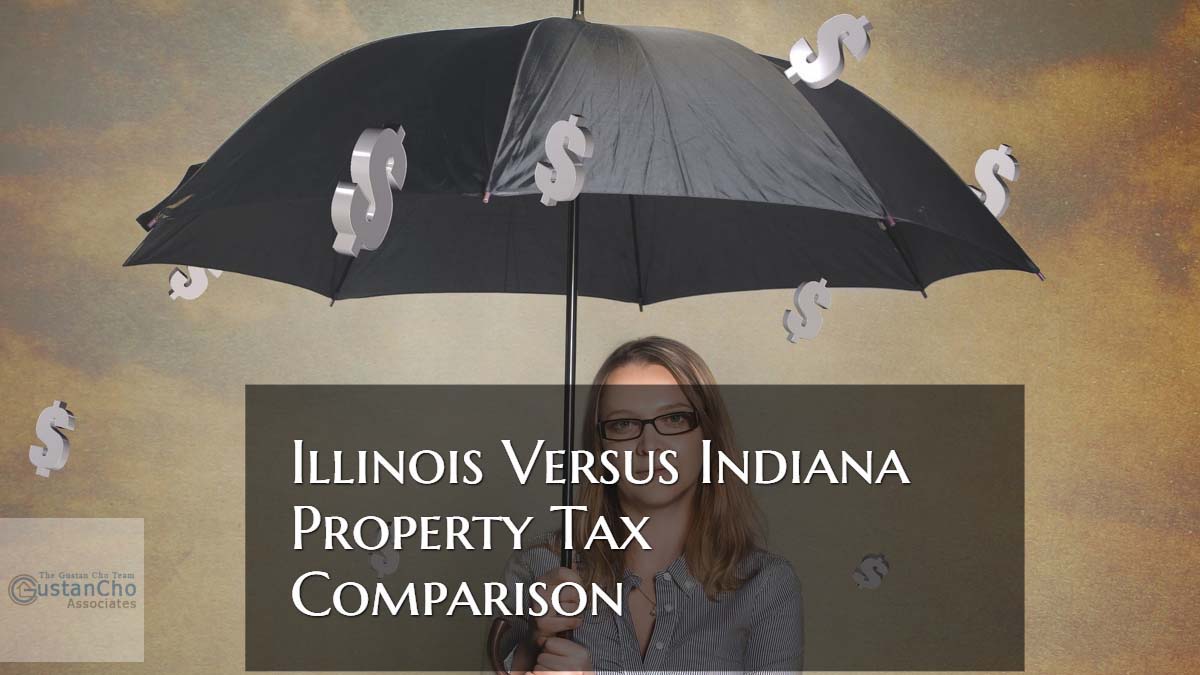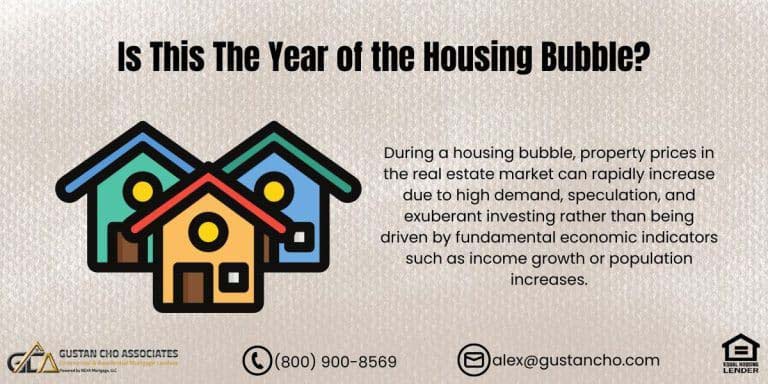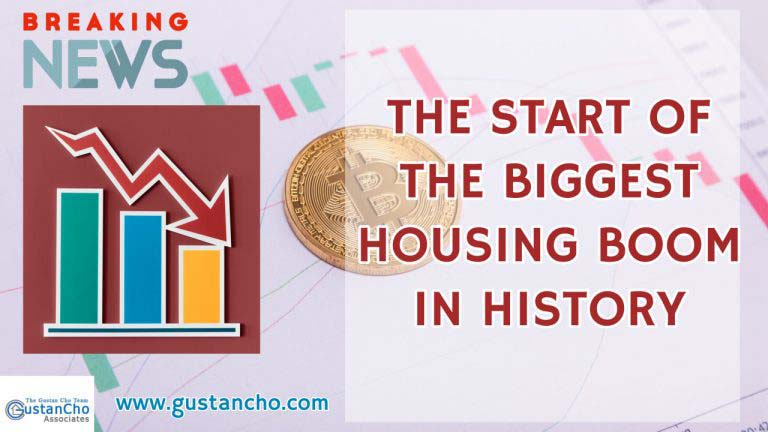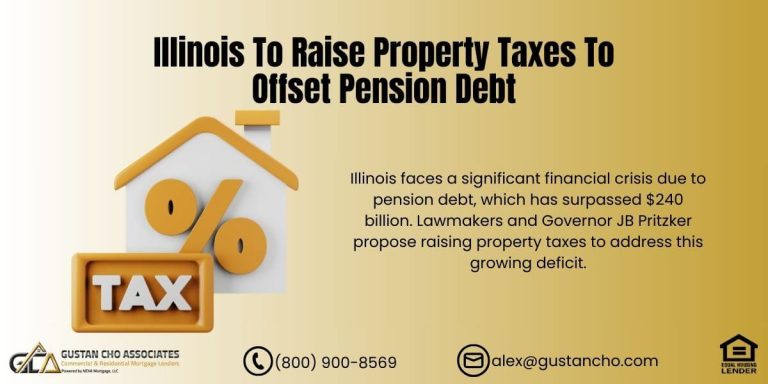This guide covers Illinois versus Indiana property tax comparison. Illinois is home to many including myself and Gustan Cho Associates. Downtown Chicago is probably one of the most beautiful spots, if not the most beautiful, in the country. Everything about Illinois is great. The city and surrounding suburbs is a melting pot of all cultures. Chicago and surrounding suburbs have the country’s best ethnic restaurants.
O’Hare International Airport is the second busiest and largest airport in the United States. Illinois is the home of world top universities like the University of Illinois, University of Chicago, and Northwestern University.
Housing prices is reasonable in Illinois. However, property taxes in many Chicago suburbs is 4% of the values of the property. This makes Illinois property taxes four times higher than the national average. This is the main reason why Illinois homeowners are leaving the state to Indiana and other neighboring states with lower taxes. We will do Illinois versus Indiana property tax comparison on this blog.
Property Tax Comparison and Why Residents Are Leaving State
We will do an Illinois versus Indiana property tax comparison. Lake County, Illinois has one of the highest property taxes in the state. Round Lake, Illinois has a population of 19,000 residents. The median sales price in Round Lake is $195,000 in the first half of 2018. Average property taxes in Round Lake, Illinois was $7,270. That is 4.0% property tax rate when the national average is 1.19%.
Which State Has Lower Property Taxes, Illinois or Indiana?
Find out where you’ll pay less in property taxes and how much you can save by movingIllinois Versus Indiana Property Tax Comparison on Similar Property
The main reason why Illinois homeowners are selling their homes and moving to Indiana is due to Illinois versus Indiana property tax comparison. The effective property tax rate in Northwest Indiana is 0.89%. A $195,000 home in Indiana will cost the homeowner $1,735.50. This is quite a savings on this Illinois versus Indiana property tax comparison.
Why would retirees and those who can work remotely not move to a state with lower property taxes. Illinois property taxes is recorded as the second highest in the United States with an effective median rate of 2.32%.
New Jersey, at 2.28%, has the highest property tax rates. Illinois homeowners pay the second-highest property taxes in the country with an effective median rate of 2.32 percent, just behind those in New Jersey’s (2.28 percent).
A Side-by-Side Look at Property Taxes in Illinois and Indiana
Buying a home or a rental property? You can’t skip the property tax details. Illinois and Indiana share a border, but their property tax rules are worlds apart, affecting what you’ll pay over the years. This guide outlines everything you need: tax rates, how property values are set, what exemptions you can claim, and how the numbers hit homeowners and property investors.
Property Taxes 101: How Illinois and Indiana Do It
Property taxes hit you locally, based on how much your home or land is worth when the tax bill is sent out. Illinois and Indiana count on property taxes to keep schools, local governments, and essential services running. The trouble is that the two states compute and apply those taxes differently. Understanding these differences matters whether you’re a first-time buyer, moving to a bigger place, or looking to add another rental to your portfolio.
Illinois Property Tax Rates and How They Work
Illinois property taxes are among the highest in the country. The average effective rate is around 2.32%, but it can be much higher or lower depending on the county or city. Illinois taxes are calculated on the assessed value of a home, which is usually one-third of what the home would sell for. The local tax rate is then multiplied by this assessed value.
Here Are the Important Things to Know About Illinois Property Taxes
- The assessed value is about 33.33% of the market price.
- Tax rates can differ greatly, but Cook County and its neighbors tend to be the highest.
- Property taxes pay for schools, city services, and county programs.
- Homeowners can lower their taxes with exemptions such as the General Homestead Exemption, Senior Citizen Homestead Exemption, and Disabled Persons Homestead Exemption.
Indiana Property Tax Rates and How They Work
Indiana usually has lower property tax rates than Illinois. The average effective rate is about 0.87%. Indiana taxes property at 100% of its true tax value, which might not match the market value. County assessors set this value by looking at recent sales and other information.
Key Points About Indiana Property Tax
- Properties are assessed at full market value (100% true tax value).
- Effective tax rates usually beat Illinois rates.
- Every county sets its rates, but Indiana taxes tend to feel lighter statewide.
- Homeowners can fit homestead deductions and credits to trim taxable value.
Key Differences Between Illinois and Indiana Property Tax Systems
- Assessment Ratio: Illinois uses a one-third market value ratio.
- Indiana uses full market value (100%).
- Effective Rates: Illinois rates are generally higher, nearly three times what Indiana charges.
- Exemptions and Credits: Both states grant homestead exemptions, but the rules, amounts, and qualifications differ.
- Tax Caps: Indiana limits annual property tax increases, which gives homeowners a clearer, steadier picture.
- Local Variations: Both states show wide local differences, yet Illinois metropolitan spots (like Chicago) usually have the steepest burden.
Impact of Property Taxes on Homeowners in Illinois and Indiana
Low property taxes are a must for homeowners. The higher effective rates in Illinois can bump annual taxes up thousands of dollars compared to Indiana. This difference affects monthly housing bills and shapes what families can afford.
Indiana’s gentler tax load often attracts homebuyers after lower bills, retirees on fixed incomes, and investors seeking cash flow.
Knowing how property taxes fit into your total housing budget is essential in Illinois and Indiana. Your budget is more than just the loan payment—it also includes property taxes, homeowner’s insurance, utilities, and ongoing maintenance.
How Different Property Taxes Shape Investment Choices
Real estate investors need to pay close attention to property taxes. Illinois’s higher rates can chew up cash flow and shrink yields on rental homes. Indiana’s lower rates can make rental properties more appealing, especially for buyers targeting slow-and-steady price growth without heavy out-of-pocket costs. In addition, Indiana’s tax caps and steady tax growth can reduce surprises and lower property owners ‘ long-term risk.
Property-Tax Breaks and Relief in Illinois and Indiana
Both Illinois and Indiana Provide Tax Relief to Eligible Homeowners, But the Rules Differ
- Illinois: The general Homestead Exemption reduces the taxable value of your main home.
- Seniors and disabled homeowners can get extra reductions.
- Indiana: The Homestead Deduction lowers the assessed value, while Circuit Breaker credits cap taxes at a set percentage of income.
Knowing how to apply for and benefit from these programs can lead to a smaller tax bill overall.
How to Appeal Your Property Tax Assessment in Illinois and Indiana
If you think your property is taxed too highly, both Illinois and Indiana let you appeal:
- Illinois: Start with the local assessor’s office or take it to the county review board.
- Indiana: Your appeal goes to the county property tax assessment board of appeals or PTABOA.
Knowing the rules and deadlines in your state—and sticking to them—can cut your tax bill.
Find Out Which State Has Lower Property Taxes
If you’re buying a home, knowing the property tax difference between Illinois and Indiana could save you bigWhich State is Friendlier to Your Wallet?
On average, Illinois has steeper property tax bills, but those dollars build strong public services. On the other hand, Indiana offers lower rates and limits on how much your taxes can rise yearly, which is great for homeowners and investors watching costs.
The right choice for you—Illinois or Indiana—depends on your personal money goals, lifestyle, and how much tax you’re willing to shoulder. Look over this side-by-side property tax comparison before you decide to buy.
Property Tax FAQs for Illinois and Indiana
Q1: Which State Charges More in Property Taxes?
- A1: Illinois averages about 2.32%, much higher than Indiana’s average of 0.87%.
Q2: What’s the Difference Between Illinois and Indiana in Figuring Out Property Taxes?
- A2: Illinois considers your home one-third of what it could sell for, while Indiana tries to determine the exact sale price and taxes at that full amount.
Q3: Can I get a homestead exemption in both places?
- A3: Sure thing!
- Illinois and Indiana give a break on taxes for your main home to lower the amount they tax.
Q4: What if My Assessment is Too High? Can I Contest It?
- A4: You can in both states!
- Illinois and Indiana let you argue your case at local appeal boards or assessment offices.
Q5: Does Indiana Stop Property Taxes From Rising Too Fast?
- A5: Yep! Indiana caps how much the taxes can go up yearly, so homeowners don’t get major surprises on their bills.
Q6: How Do Property Taxes Affect What I Can Afford To Buy?
- A6: Illinois’s higher property taxes make your monthly payment larger, so homes feel pricier than in Indiana, where tax bills are usually smaller.
Q7: Is The Property Tax Rate the Same Regardless of Where I Live in Each State?
- A7: Not at all.
- Both states have rates that can vary depending on the county or city you live in.
Q8: Which State Offers More Property Tax Relief for Seniors?
- A8: Indiana and Illinois have programs to help seniors with property taxes.
- Indiana stands out with its circuit breaker credit, especially for low-income seniors.
- At the same time, Illinois offers several exemptions with different income and age criteria.
Q9: How Do Property Taxes Affect Real Estate Investment Returns in Illinois and Indiana?
- A9: In general, property taxes are higher in Illinois, which can lower your cash flow from investments.
- Indiana’s lower rates usually lead to better cash flow and higher overall returns.
Q10: Where Can I Find More Information About Property Tax Rates in Illinois and Indiana?
- A10: For the most accurate and current rates, check the website of your county assessor’s office or the state department of revenue.
Want expert help comparing how mortgage and property tax rates affect your investment in Illinois or Indiana? Contact us anytime for customized advice!
Illinois or Indiana? Choose the Smarter Move
Property taxes can vary thousands of dollars a year. Find out if Illinois or Indiana will keep more cash in your pocket.Communities In Illinois Versus Indiana Property Tax Comparison
The following date reflects home prices versus property taxes in some communities in Lake County, Illinois.
| City | Jan – June 2018 Sales | Jan – June 2018 Median Price | Median tax | Effective tax rate |
| Zion | 182 | $116,603 | $4,987 | 4.28% |
| Volo | 14 | $245,500 | $9,854 | 4.01% |
| Hainesville | 50 | $140,295 | $5,628 | 4.01% |
| Grayslake | 220 | $209,500 | $8,380 | 4.00% |
| Lakemoor | 14 | $190,500 | $6,860 | 3.60% |
| Lake Villa | 90 | $221,750 | $7,964 | 3.59% |
| Lindenhurst | 152 | $201,000 | $7,170 | 3.57% |
| Beach Park | 74 | $155,843 | $5,368 | 3.44% |
| Third Lake | 10 | $281,750 | $9,633 | 3.42% |
| Round Lake | 122 | $197,000 | $6,713 | 3.41% |
| Round Lake Heights | 13 | $157,000 | $5,104 | 3.25% |
| Winthrop Harbor | 61 | $177,000 | $5,748 | 3.25% |
| Long Grove | 79 | $577,500 | $18,470 | 3.20% |
| Lincolnshire | 67 | $440,000 | $13,527 | 3.07% |
| Buffalo Grove | 240 | $340,000 | $10,116 | 2.98% |
| Round Lake Beach | 213 | $138,000 | $4,073 | 2.95% |
| Tower Lakes | 9 | $362,500 | $10,610 | 2.93% |
| Antioch | 203 | $220,000 | $6,329 | 2.88% |
| Gurnee | 254 | $234,450 | $6,712 | 2.86% |
| Wauconda | 92 | $220,000 | $6,246 | 2.84% |
| Waukegan | 323 | $127,900 | $3,596 | 2.81% |
| Cary | 5 | $246,500 | $6,743 | 2.74% |
| Gages Lake | 84 | $191,000 | $5,197 | 2.72% |
| Round Lake Park | 27 | $121,000 | $3,283 | 2.71% |
| Horatio Gardens | 9 | $280,000 | $7,555 | 2.70% |
| North Barrington | 19 | $525,000 | $14,147 | 2.69% |
| Fox Lake | 72 | $166,750 | $4,493 | 2.69% |
| Highland Park | 204 | $476,250 | $12,806 | 2.69% |
| Long Lake | 25 | $111,500 | $2,990 | 2.68% |
| Lotus Woods | 7 | $108,500 | $2,898 | 2.67% |
| Deerfield | 205 | $440,000 | $11,741 | 2.67% |
| Kildeer | 30 | $577,450 | $15,394 | 2.67% |
| Lake Catherine | 14 | $155,250 | $4,067 | 2.62% |
| Grandwood Park | 60 | $255,000 | $6,638 | 2.60% |
| Channel Lake | 9 | $150,305 | $3,904 | 2.60% |
| Bannockburn | 7 | $900,000 | $23,217 | 2.58% |
| Riverwoods | 18 | $612,500 | $15,730 | 2.57% |
| Vernon Hills | 220 | $325,000 | $8,247 | 2.54% |
| Hawthorn Woods | 76 | $480,274 | $12,052 | 2.51% |
| Park City | 6 | $147,500 | $3,651 | 2.48% |
| Libertyville | 215 | $388,000 | $9,586 | 2.47% |
| Island Lake | 23 | $194,000 | $4,772 | 2.46% |
| Wadsworth | 26 | $362,500 | $8,752 | 2.41% |
| Lake Barrington | 92 | $298,000 | $7,182 | 2.41% |
| Mundelein | 85 | $185,000 | $4,448 | 2.40% |
| Spring Grove | 8 | $125,000 | $3,004 | 2.40% |
| Barrington | 63 | $412,500 | $9,870 | 2.39% |
| Green Oaks | 23 | $547,500 | $12,667 | 2.31% |
| Forest Lake | 13 | $245,000 | $5,624 | 2.30% |
| Lake Zurich | 137 | $330,000 | $7,412 | 2.25% |
| Venetian Village | 25 | $159,900 | $3,589 | 2.24% |
| Deer Park | 27 | $500,000 | $11,168 | 2.23% |
| Highwood | 15 | $312,000 | $6,966 | 2.23% |
| Fox Lake Hills | 36 | $183,000 | $3,994 | 2.18% |
| Ingleside Shore | 33 | $194,500 | $4,105 | 2.11% |
| Barrington Hills | 5 | $937,500 | $19,745 | 2.11% |
| Knollwood | 11 | $280,000 | $5,830 | 2.08% |
| North Chicago | 58 | $105,500 | $2,174 | 2.06% |
| Lake Bluff | 57 | $560,000 | $11,197 | 2.00% |
| Lake Forest | 171 | $820,000 | $14,244 | 1.74% |
Property Tax Comparison and Home Prices
The following data below show towns and cities in Lake County, Illinois. It is categorized by median sale price. It is calculated by taking prices of properties sold during the first six months of 2018.
| City | Jan – June 2017 Sales | Jan – June 2017 Median Price | Jan – June 2018 Sales | Jan – June 2018 Median Price | Change |
| North Chicago | 59 | $65,000 | 58 | $105,500 | 62.31% |
| Grandwood Park | 47 | $180,000 | 60 | $255,000 | 41.67% |
| Wadsworth | 29 | $270,000 | 26 | $362,500 | 34.26% |
| Lakemoor | 26 | $144,950 | 14 | $190,500 | 31.42% |
| Channel Lake | 20 | $115,450 | 9 | $150,305 | 30.19% |
| Bannockburn | 3 | $725,000 | 7 | $900,000 | 24.14% |
| Ingleside Shore | 38 | $159,000 | 33 | $194,500 | 22.33% |
| Zion | 167 | $96,000 | 182 | $116,603 | 21.46% |
| Round Lake Park | 34 | $100,515 | 27 | $121,000 | 20.38% |
| Horatio Gardens | 8 | $234,500 | 9 | $280,000 | 19.40% |
| Venetian Village | 26 | $137,450 | 25 | $159,900 | 16.33% |
| Antioch | 148 | $190,500 | 203 | $220,000 | 15.49% |
| Winthrop Harbor | 58 | $155,500 | 61 | $177,000 | 13.83% |
| Lotus Woods | 5 | $96,000 | 7 | $108,500 | 13.02% |
| Round Lake Beach | 205 | $123,000 | 213 | $138,000 | 12.20% |
| Barrington Hills | 7 | $837,500 | 5 | $937,500 | 11.94% |
| Park City | 4 | $133,000 | 6 | $147,500 | 10.90% |
| Third Lake | 14 | $255,450 | 10 | $281,750 | 10.30% |
| Round Lake | 128 | $179,350 | 122 | $197,000 | 9.84% |
| Vernon Hills | 280 | $296,000 | 220 | $325,000 | 9.80% |
| Lake Catherine | 14 | $141,500 | 14 | $155,250 | 9.72% |
| Volo | 23 | $224,670 | 14 | $245,500 | 9.27% |
| Lake Bluff | 78 | $513,000 | 57 | $560,000 | 9.16% |
| Deer Park | 33 | $460,000 | 27 | $500,000 | 8.70% |
| Lincolnshire | 85 | $405,000 | 67 | $440,000 | 8.64% |
| Fox Lake Hills | 32 | $171,450 | 36 | $183,000 | 6.74% |
| Waukegan | 362 | $120,000 | 323 | $127,900 | 6.58% |
| Gurnee | 286 | $221,500 | 254 | $234,450 | 5.85% |
| Wauconda | 96 | $208,000 | 92 | $220,000 | 5.77% |
| Buffalo Grove | 246 | $321,959 | 240 | $340,000 | 5.60% |
| Spring Grove | 8 | $118,750 | 8 | $125,000 | 5.26% |
| Libertyville | 228 | $369,000 | 215 | $388,000 | 5.15% |
| Island Lake | 28 | $186,250 | 23 | $194,000 | 4.16% |
| Lake Zurich | 146 | $320,000 | 137 | $330,000 | 3.13% |
| Kildeer | 39 | $560,000 | 30 | $577,450 | 3.12% |
| Lindenhurst | 140 | $197,500 | 152 | $201,000 | 1.77% |
| Grayslake | 220 | $209,000 | 220 | $209,500 | 0.24% |
| Green Oaks | 27 | $550,000 | 23 | $547,500 | -0.45% |
| Barrington | 63 | $415,000 | 63 | $412,500 | -0.60% |
| Deerfield | 173 | $445,000 | 205 | $440,000 | -1.12% |
| Lake Forest | 132 | $829,825 | 171 | $820,000 | -1.18% |
| Mundelein | 98 | $187,750 | 85 | $185,000 | -1.46% |
| Long Grove | 67 | $590,000 | 79 | $577,500 | -2.12% |
| Highland Park | 235 | $488,000 | 204 | $476,250 | -2.41% |
| Beach Park | 101 | $160,000 | 74 | $155,843 | -2.60% |
| Hainesville | 36 | $144,975 | 50 | $140,295 | -3.23% |
| Fox Lake | 76 | $172,500 | 72 | $166,750 | -3.33% |
| Hawthorn Woods | 86 | $499,678 | 76 | $480,274 | -3.88% |
| Riverwoods | 35 | $637,500 | 18 | $612,500 | -3.92% |
| North Barrington | 35 | $550,000 | 19 | $525,000 | -4.55% |
| Lake Villa | 98 | $232,500 | 90 | $221,750 | -4.62% |
| Gages Lake | 84 | $203,500 | 84 | $191,000 | -6.14% |
| Knollwood | 10 | $315,000 | 11 | $280,000 | -11.11% |
| Round Lake Heights | 22 | $179,950 | 13 | $157,000 | -12.75% |
| Lake Barrington | 76 | $345,000 | 92 | $298,000 | -13.62% |
| Forest Lake | 16 | $284,500 | 13 | $245,000 | -13.88% |
| Tower Lakes | 9 | $427,000 | 9 | $362,500 | -15.11% |
| Long Lake | 33 | $147,000 | 25 | $111,500 | -24.15% |
| Highwood | 10 | $424,000 | 15 | $312,000 | -26.42% |
| Cary | 6 | $374,750 | 5 | $246,500 | -34.22% |
Gustan Cho Associates is an a national mortgage company with no overlays on government and conventional loans. Home buyers who are thinking of relocating to a different state with lower home prices and property taxes, please contact us at 800-900-8569 or text us for a faster response. Or email us at gcho@gustancho.com.








